LAYING FOUNDATION BEFORE TRAINING COMBAT
Many people say that the basics are very important, but judging from their practice, it is obvious that they only pay lip service to this saying. Some of them may not know what is really meant by the basics.
In our school we pay great importance to the basics —- they form the foundation upon which all our future development depends. By basics, we refer to our stances, footwork, body-movement, hand forms as well as entering Zen, generating chi flow and exploding force.
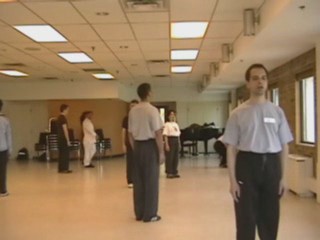 Entering Zen and Chi Flow
Entering Zen and Chi Flow
Entering Zen and Chi Flow are two of the most important lessons in our school, and they are taught right at the beginning of every course. With these two attainments, our training becomes internal, and all our kungfu practice becomes meditation and chi kung. Amongst other wonderful benefits, they give us mental clarity and internal force.
 The Horse-Riding Stance
The Horse-Riding Stance
Practicing the Horse-Riding Stance is very important in any kungfu training. However, many others nowadays think that stances are not important. We in Shaolin Wahnam spent much time practicing the stances, especially the Horse-Riding Stance. Do you know why?
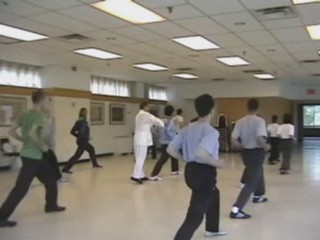 Juniors and Masters Practicing Stances Together
Juniors and Masters Practicing Stances Together
It is significant to note that participants in this course range from juniors to masters, but all of them practice zhan zhuang or stance training together. This gives an indication of the great importance of the stances.
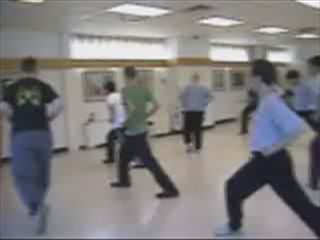 Importance of Waist Rotation in Footwork
Importance of Waist Rotation in Footwork
Besides stances, footwork is also very important. Stances and footwork form the concept of “ma-bo” in Mandrin or “ma-pou” in Cantonese. “Ma” means stances, and “bo” means footwork. Here participants practice moving in the Bow-Arrow Stance with emphasis on rotation of the waist.
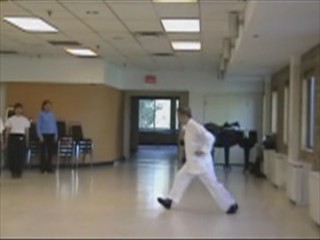 Reducing Big Movements to Small Movements
Reducing Big Movements to Small Movements
The uninitiated may criticize that our movements in stances are slow, and question how such slow movement can be effective in combat. What they do not realize is that this is the first part of the training where correctness of form and movement is emphasized. When this is achieved, the speed of the movements will be increased. One significant way is to reduce big movements to small movements.
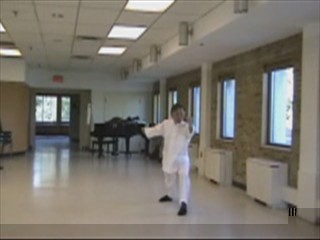 Poor Footwork may Lead to Knee Injuries
Poor Footwork may Lead to Knee Injuries
Having spent some time on the basics, the class learns the initial movements of Tantui, and some common mistakes many people make, which often lead to knee injuries. These common mistakes are due to poor footwork and lack of waist rotation.
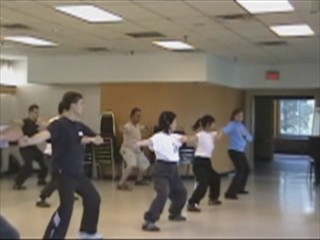 Footwork and Body-Movement
Footwork and Body-Movement
Participants practice the Tantui movements pattern by pattern. Much attention is paid to footwork and body-movement, two aspects many students neglect.
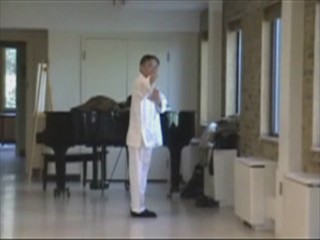 Picture-Perfect Form
Picture-Perfect Form
Course participants go over the patterns of Sequence 1, which is traditionally called “Thrust Punch”. But we prefer to use a more poetic name, “Big Boss Offers Wine”. The objective in this practice session is to attain picture-perfect form. Please note the difference between solo Tantui sequences and Tantui combat sequences. This Sequence 1 is a solo Tantui sequence. The Tantui Combat Sequence 1 is "Second Brother Offers Wine".
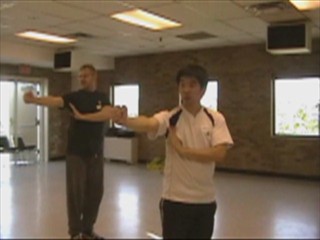 Performing Patterns One at a Time
Performing Patterns One at a Time
The class performs Sequence 1 pattern by pattern. Here the focus is on picture-perfect form. Hence, the patterns are performed one at a time.
 Patterns Performed in Smooth Sequence
Patterns Performed in Smooth Sequence
The sequence is first performed pattern by pattern, with a pause after each pattern. Then the sequence is performed in one smooth slow as if all the patterns in the sequence were just one long, continuous pattern.
Laying Foundation Before Training Combat in Shaolin Tantui from Wong Kiew Kit on Vimeo.
LINKS
12 Sequences of Tantui
Tantui in Picture Series
Combat Application of Tantui
Treasure House of Kungfu Sets
Treasure House of Combat Application
